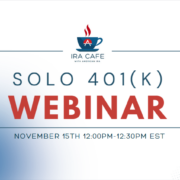Understanding Your Self-Directed Solo 401K : The Basics
If you’ve been reading this site, then you know about the benefits of self-directing your retirement account. You’ve read about 401(k) plans, Roth IRAs, and the like. You have all sorts of retirement ideas, and you know exactly how you want to get there. Then you realize that many of these plans aren’t provided by an employer because you’re your own entrepreneur. Suddenly, this idea of a Self-Directed Solo 401K comes along, and you’re forced to ask:
What if you’re in business for yourself, with no full-time employees except for yourself and maybe your spouse?
Small business owners need retirement plans, too, and that’s why this particular account exists: it gives self-employed entrepreneurs the opportunity to create their own 401(k) plans, and utilize the benefits of a 401(k) without being employed by anyone else. It means you can have your freedom and save for retirement. For many people, it’s not only the best of both worlds: it’s a way of life.
Defining the Self-Directed Solo 401K
First things first: we have to be clear about what exactly this retirement plan is. As the IRS website states, the Solo 401(k) plan itself isn’t a new type of 401(k). In fact, it’s the same type of retirement account…with the difference being that it’s designed for someone in charge of their own employment (and not the employment of anyone else except a spouse). If you own and operate your own enterprise by yourself, this is the 401(k) plan for you. The IRS states that these plans have the same “rules and requirements” as other 401(k) plans. If you’ve ever had a 401(k) in the past, that means you already know a little something about how these solo plans work.
But what about that key phrase in front: “Self-Directed”? It’s quite simple: a self-directed account is one you take charge of yourself,
Advantages and Requirements/Restrictions
First, the advantages of this Self-Directed Solo 401K:
- High contribution limits. If you’re an aggressive sort of investor who wants to put a lot of money away for retirement, this retirement account might be for you. Contribution and deferrals can depend on your circumstances, however, so be sure to review the rules at the IRS website for more details.
- Salary deferral based on your role as the “employee” of your company comes with a limit, but many investors find that it can be an advantage.
Of course, not everyone is eligible to use and manage their own Self-Directed Solo 401K:
- If you employee non-qualified people full-time, then your ability to use a solo 401(k) ceases to exist. You can only use this kind of retirement account with yourself and potentially a spouse.
- If you hold another 401(k) plan by working for a second company, your contributions are still limited to you, not on a plan-by-plan basis.
Who’s Right for the Self-Directed Solo 401K?
Anyone who meets the requirements for this type of retirement account will want to at least consider it, thanks to all of the benefits of investing through retirement accounts. Anyone who already employs themselves at their own company (without other full-time employees outside of a spouse) has some degree of individuality and entrepreneurship about them, so they’ll likely find that self-directing their own retirement plan isn’t a major leap for them.
If you think you not only qualify but would prefer this type of investing, be sure to contact us at 1-866-7500-IRA (472) or keep reading our material here at AmericanIRA.com to learn more information about retirement investing on your terms. You’ll be amazed at what you’re capable of when you take charge of your financial destiny.





